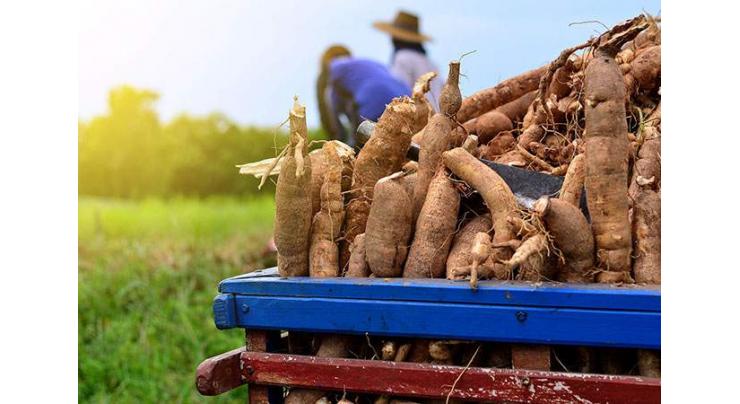
Gene Editing Leads To Faster Production Of Food-friendly Cassava: Swiss Study
Faizan Hashmi Published September 06, 2018 | 04:22 PM

Swiss scientists have recently succeeded in using gene-editing technology to develop a variant of the starchy tuber cassava that is preferred by the food and paper industries, the Swiss Federal Institute of Technology (ETH Zurich) said on Wednesday.
GENEVA, (APP - UrduPoint / Pakistan Point News - 6th Sep, 2018 ) :Swiss scientists have recently succeeded in using gene-editing technology to develop a variant of the starchy tuber cassava that is preferred by the food and paper industries, the Swiss Federal Institute of Technology (ETH Zurich) said on Wednesday.
Cassava is one of the world's most important starch crops. Although the plants are hardy and can survive even in drought conditions, which makes it one of the top five most important sources of carbohydrate globally, it's time-consuming to cross-breed useful new traits into different farmer-preferred varieties.
In a study recently published on the journal Science Advances, researchers at ETH Zurich opted to take a new approach to introduce new traits into cassava.
They used the famous CRISPR-Cas9 gene editing tool, dubbed gene scissors, to change two cassava genes so that the plant produces modified starch that has little or no amylose, and is in high demand on the global market.
To achieve this, the researchers inserted a block of several foreign genes into the cassava plants.
This block included the genes for the Cas9 protein and for the guide RNA molecule that the CRISPR-Cas9 system needs in order to cut the genetic material at the desired point. It also contained a gene from another plant, called the thale cress Arabidopsis, to accelerate flowering.
As starch is composed of about 85 percent of amylopectin and 15 percent of amylose, the latter being the cause that makes processing the plant for food very difficult, the new variant turned out to be much easier to process commercially. Meanwhile, more frequent flowering made it easier to breed the new, amylose-free variety much faster, and to produce offspring that did not contain any foreign Arabidopsis genes.
For that reason, the industry would be particularly interested in amylose-free cassava starch, as removal of amylose usually requires more processing and energy-consuming methods for starch purification. Also, consumers may also prefer the waxy, amylose-free starch which is an important source of carbohydrates particularly in the southern hemisphere and in African countries.
Recent Stories

Currency Rate In Pakistan - Dollar, Euro, Pound, Riyal Rates On 26 April 2024

Today Gold Rate in Pakistan 26 April 2024

ICC Womens T20 World Cup Qualifier, Match 2: Ireland Women open with Comfortable ..

Robinson, bowlers help New Zealand go 2-1 up against Pakistan

Shahzeb Chachar to hold khuli kachehri on April 26

Heatwave amid Israel's aggression in Gaza brings new misery, disease risk

Tourism must change, mayor says as Venice launches entry fee

Court adjourns Judicial Complex attack case till May 17

Nasreen Noori’s book ‘Popatan Jahra Khwab’ launched

Wafaqi Mohtasib inspection team visits Excise and taxation office

AJLAC announces 5th Conference titled ‘People’s Mandate: Safeguarding Civil ..

Pak-US officials engage to enhance trade, investment ties
More Stories From World
-
ByteDance says 'no plans' to sell TikTok after US ban law
39 minutes ago -
Oil: 'Mother of corruption' in Venezuela
39 minutes ago -
ECO General Secretary urges member nations to embrace cultural wealth
40 minutes ago -
China warns Blinken over deteriorating ties in talks
50 minutes ago -
Famine-threatened Sudan's 'race against time' to plant crops
60 minutes ago -
Microsoft, Google earnings shine as AI drives revenue
1 hour ago
-
Man City crush Brighton to close gap on Arsenal in title race
1 hour ago -
Atletico face Bilbao challenge in Champions League race
1 hour ago -
Man City in title groove as Arsenal face Spurs test
1 hour ago -
Japan anime studio draws on talent of autistic artists
2 hours ago -
Pakistan needs strong defence in view of its location in 'rough' neighbourhood: Masood Khan
2 hours ago -
Bangladesh children sweat at home as heatwave shuts schools
2 hours ago